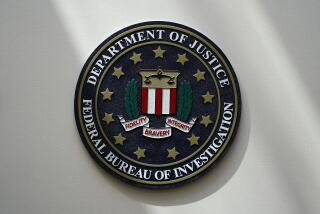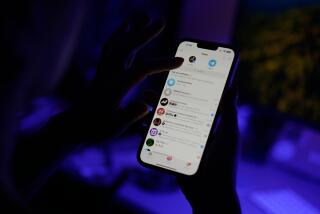U.S. Charges Suspect With Conspiracy in Sept. 11 Plot
WASHINGTON — Laying out a detailed case against Osama bin Laden’s global terrorist network, a federal grand jury Tuesday charged a French man of Moroccan descent with conspiring to “kill and maim” thousands of Americans in the attacks on the World Trade Center and the Pentagon.
The indictment of Zacarias Moussaoui--the first person charged in the United States in the attacks--came three months to the day after hijacked commercial airliners rammed into the landmark buildings in New York and outside Washington and a Pennsylvania field.
Moussaoui, 33, was accused of plotting with Bin Laden, top aide Ayman al-Zawahiri and other known associates of the alleged terrorist mastermind’s Al Qaeda network to help carry out the Sept. 11 attacks, along with the 19 suspected hijackers.
Atty. Gen. John Ashcroft said Moussaoui was “an active participant” in the plot, a college-educated militant who learned urban warfare in Bin Laden’s war camps in Afghanistan, received financing from top Al Qaeda leaders, bought knives and flight training lessons, and made inquiries about crop-dusting equipment--just as many of the alleged hijackers did.
FBI Director Robert Mueller hinted that Moussaoui had been designated to be a 20th hijacker had he not been jailed a month before the attacks.
The 31-page indictment offered rich details of an international terrorist plot that spanned several continents, dated back to 1998 and linked the hijackers to men accused of being top Al Qaeda commanders, in part through wire transfers of tens of thousands of dollars.
“The indictment issued today is a chronicle of evil, a carefully documented year-by-year, month-by-month, day-by-day account of a terrorist conspiracy that gathered both force and intensity in the weeks before Sept. 11,” Ashcroft said. “Zacarias Moussaoui is alleged to have been an active participant in this conspiracy, alongside the 19 terrorists who carried it out. Moussaoui is charged with undergoing the same training, receiving the same kind of funding and pledging the same commitment to kill Americans as the hijackers.”
Moussaoui could face the death penalty if convicted, even though the indictment--and top federal law enforcement officials--did not directly link him to the plot, to any of the hijackers or to Bin Laden and other Al Qaeda chieftains.
Those law enforcement officials, and the indictment, also provided no details indicating whether the U.S. government has established direct evidence linking Bin Laden and his top commanders to the attacks, which killed more than 3,000 people and launched a U.S. war against the Taliban government in Afghanistan.
Nevertheless, Ashcroft said the indictment shows that the massive investigation was bearing fruit and that Moussaoui was an active and willing participant in the conspiracy.
Ashcroft announced the indictment at a news conference where he was joined by Mueller and the Justice Department’s top criminal prosecutor, Assistant Atty. Gen. Michael Chertoff, who, the indictment indicates, is overseeing the prosecution.
The six-count indictment was handed up by a federal grand jury operating under in secrecy in Alexandria, Va., overseen by top Justice Department officials and using information gleaned from terrorism investigations in the United States and other nations.
Civil rights activists praised the decision to indict Moussaoui in criminal court rather than try him before a military tribunal that could conceivably operate in secret and sentence him to death without a unanimous conviction.
“The indictment is a positive step by the Bush administration toward making good on its pledge to use military commissions sparingly,” said Elisa Massimino, director of the Washington office of the Lawyers Committee for Human Rights. “The nature of Moussaoui’s indictment makes it hard to imagine a case that could justify the use of military courts inside the United States.”
Suspect Taken Into Custody in August
Moussaoui was linked to Bin Laden’s Al Qaeda network even before he came to the United States from London in February 2001. He was taken into custody on immigration violations in mid-August after employees at a flight training school in Minnesota became suspicious of him, particularly because of his attempts to learn how to fly a commercial airliner.
Moussaoui initially refused to speak with federal authorities, but Mueller declined to comment Tuesday on whether he has agreed to cooperate in the continuing investigation. In Europe, several other men are wanted for allegedly playing central roles in the Sept. 11 attacks, including Ramzi Binalshibh, an associate of both Moussaoui and suspected lead hijacker Mohamed Atta.
Moussaoui is scheduled to be arraigned Jan. 2. Justice officials said that, so far, he has not asked for a lawyer in the current proceedings and has not been appointed one.
In a letter written to his mother from his jail cell, Moussaoui declared that he was innocent, according to a French newspaper report last month. He apologized to her for causing her pain but denied the accusations against him.
On Tuesday evening, the accused terrorist’s mother broke down, wept and hung up the phone after hearing that the charges could carry the death penalty, Associated Press reported. “I’m in shock,” Aicha Moussaoui was quoted as saying. “I’m trembling.”
The charges against Moussaoui include conspiracy to commit murder, acts of terrorism transcending national boundaries, aircraft piracy and destruction of aircraft, and conspiracy to use weapons of mass destruction.
Each of the six counts could bring Moussaoui the death penalty or life in prison. That means a conviction on just one of the charges could keep him in prison for life, authorities and legal experts said.
One former top Justice Department official familiar with bringing terrorism cases cautioned that the government may be withholding its most damaging evidence linking Moussaoui directly to the hijacking plot to maintain a tactical advantage over defense lawyers. That former prosecutor, and constitutional experts, said the legal threshold for convicting Moussaoui on conspiracy charges is relatively low.
Even so, the indictment portrays Moussaoui as someone merely on the edges of the Sept. 11 conspiracy. It offers no direct proof but rather circumstantial evidence based on timing, location and finances. For instance, the hijackers began buying their plane tickets within eight days of Moussaoui’s arrest.
But the indictment does not cite any instance in which Moussaoui talked to or met with the hijackers.
The document does, however, mention many similarities among the men. Like some of the hijackers, Moussaoui spent time in Bin Laden’s terrorist training camps in Afghanistan, it said.
Moussaoui attended the Khalden camp in early 1998, about the same time as Ahmed Ressam, the Algerian national later convicted of helping lead an Al Qaeda-supervised plot to detonate a bomb at Los Angeles International Airport two years ago.
There were other similarities: Like the hijackers, Moussaoui obtained flight training, joined a gym, made inquiries about the use of crop-dusting equipment and Global Positioning System equipment, and purchased flight simulator programs and knives, the indictment said.
Suspect’s Links to Fugitives Detailed
The indictment also describes how Moussaoui worked in concert with unindicted co-conspirators Binalshibh and Mustafa Ahmed al-Hawsawi, who are fugitives, to carry out the Sept. 11 attacks. Authorities have described Hawsawi as a top Bin Laden “paymaster.” The indictment alleges that Binalshibh--a former roommate of Atta in Germany--wired $14,000 to Moussaoui last summer while Moussaoui was attending flight school in Norman, Okla.
Binalshibh, who was in Germany at the time, had earlier wired money to several of the hijackers as they attended flight training classes in Florida.
FBI chief Mueller has said he believes Binalshibh was the first man designated to be the 20th hijacker in the plot but that he was denied entry into the United States on four occasions in 2000.
On Tuesday, Mueller suggested--without offering proof--that Moussaoui may have been trying to take Binalshibh’s place on one of the four hijack teams after Binalshibh was denied visas.
Unlike the planes that crashed into the two World Trade Center towers and the Pentagon, a fourth plane believed to be headed for Washington, D.C., is thought to have had only four hijackers aboard instead of five. That plane crashed into a Pennsylvania field after passengers apparently attempted to overcome the hijackers.
Mueller was asked bluntly Tuesday whether the government had evidence that Moussaoui was designated to replace Binalshibh. He responded: “Well, I think if you parse the indictment you will see that . . . subsequent to that fourth time [Binalshibh] was rejected, you will see Mr. Moussaoui attempting to come in the United States. Those are the allegations in the indictment, and the indictment speaks for itself.”
Dispute Over Special Warrant Addressed
Mueller also addressed a matter of some controversy within the Justice Department regarding the Moussaoui investigation.
After Moussaoui was detained, FBI agents in Minnesota wanted to get a special warrant to review the contents of his laptop computer, but FBI lawyers in Washington “believed there was insufficient probable cause,” Mueller said. The matter became a point of contention after Sept. 11, as some within the FBI and Justice Department suggested that such a warrant may have somehow tipped authorities to the impending attacks.
Law enforcement officials have said, however, that nothing in Moussaoui’s computer would have given them warning of the attack. Mueller appeared to agree Tuesday.
“Now, could we have done something else, perhaps . . . who can say?” Mueller asked. “All I can tell you is that the agents on the scene attempted to follow up aggressively. The [FBI] attorneys . . . believed there was insufficient probable cause for a [warrant], which appears to be an accurate decision. And Sept. 11 happened.”
Times staff writer Sebastian Rotella in Paris contributed to this report.
More to Read
Sign up for Essential California
The most important California stories and recommendations in your inbox every morning.
You may occasionally receive promotional content from the Los Angeles Times.










